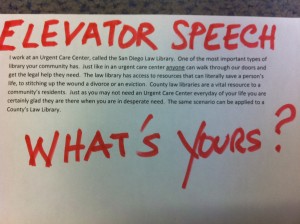 After my post, “What to say when someone asks, ‘What do you do?”‘ I read an interesting take on the issue at The Non Billable Hour. In, “The Haiku of What You do,” Matt Homann suggests crafting your answer using Haiku.
After my post, “What to say when someone asks, ‘What do you do?”‘ I read an interesting take on the issue at The Non Billable Hour. In, “The Haiku of What You do,” Matt Homann suggests crafting your answer using Haiku.
As you might recall from fourth grade English, a Haiku is a three line poem consisting of 17 words (or syllables), five on the first line, seven on the second line, and five on the third. Homann suggests structuring your response as follows:
- Who do I help? (Answer in Five Words)
- What do I do for them? (Answer in Seven Words)
- Why do they need me? (Answer in Five Words)
The minimalist nature of Haiku lends itself well to an elevator speech. It forces you to get to the essence of what you do and for whom you do it.
Holmann offers this example for a personal injury attorney:
I help injured accident victims
understand their rights and recover medical expenses
from people who are responsible.
Here’s what I came up with for what I do:
I show attorneys how to
get more clients and increase their income
accomplishing more and working less.
Give it a try and see what you come up with. Post your results in the comments.








